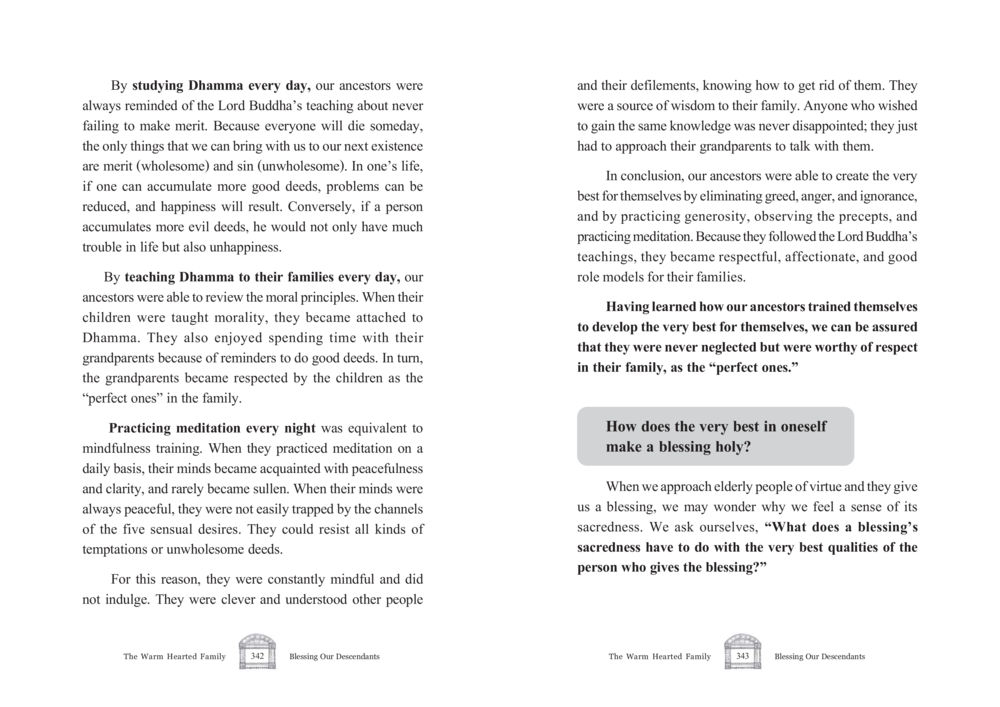The Importance of Dhamma in Family Life : หน้า 172/207
The Warm Hearted Family : หน้า 172/207 Explore how daily study of Dhamma and meditation shapes family values and fosters respect among generations.
0 ครั้ง

สรุปเนื้อหา
Daily practice of Dhamma has been essential for past generations, teaching the importance of accumulating merit over sin. By fostering moral values in families, ancestors contributed to the development of respect and virtue. Meditation played a key role in maintaining peace and resisting temptations, making grandparents sources of wisdom and moral guidance. This cycle of teaching and blessing solidified their status as 'perfect ones' in the family. Embracing these teachings leads us to a deeper understanding of sacredness in their blessings. For more insights, visit dmc.tv.
หัวข้อประเด็น
-Dhamma and daily life
-Importance of meditation
-Accumulating merit
-Family respect and values
-Role of grandparents
ข้อความต้นฉบับในหน้า
By studying Dhamma every day, our ancestors were always reminded of the Lord Buddha’s teaching about never failing to make merit. Because everyone will die someday, the only things that we can bring with us to our next existence are merit (wholesome) and sin (unwholesome). In one’s life, if one can accumulate more good deeds, problems can be reduced, and happiness will result. Conversely, if a person accumulates more evil deeds, he would not only have much trouble in life but also unhappiness.
By teaching Dhamma to their families every day, our ancestors were able to review the moral principles. When their children were taught morality, they became attached to Dhamma. They also enjoyed spending time with their grandparents because of reminders to do good deeds. In turn, the grandparents became respected by the children as the “perfect ones” in the family.
Practicing meditation every night was equivalent to mindfulness training. When they practiced meditation on a daily basis, their minds became acquainted with peacefulness and clarity, and rarely became sullen. When their minds were always peaceful, they were not easily trapped by the channels of the five sensual desires. They could resist all kinds of temptations or unwholesome deeds.
For this reason, they were constantly mindful and did not indulge. They were clever and understood other people and their defilements, knowing how to get rid of them. They were a source of wisdom to their family. Anyone who wished to gain the same knowledge was never disappointed; they had to approach their grandparents to talk with them.
In conclusion, our ancestors were able to create the very best for themselves by eliminating greed, anger, and ignorance, and by practicing generosity, observing the precepts, and practicing meditation. Because they followed the Lord Buddha’s teachings, they became respectful, affectionate, and good role models for their families.
Having learned how our ancestors trained themselves to develop the very best for themselves, we can be assured that they were never neglected but were worthy of respect in their family, as the “perfect ones.”
**How does the very best in oneself make a blessing holy?**
When we approach elderly people of virtue and they give us a blessing, we may wonder why we feel a sense of sacredness. We ask ourselves, “What does a blessing’s sacredness have to do with the very best qualities of the person who gives the blessing?”
หน้าหนังสือทั้งหมด

1

2

3

4

5

6

7

8

9

10

11

12

13

14

15

16

17

18

19

20

21

22

23

24

25

26

27

28

29

30

31

32

33

34

35

36

37

38

39

40

41

42

43

44

45

46

47

48

49

50

51

52

53

54

55

56

57

58

59

60

61

62

63

64

65

66

67

68

69

70

71

72

73

74

75

76

77

78

79

80

81

82

83

84

85

86

87

88

89

90

91

92

93

94

95

96

97

98

99

100

101

102

103

104

105

106

107

108

109

110

111

112

113

114

115

116

117

118

119

120

121

122

123

124

125

126

127

128

129

130

131

132

133

134

135

136

137

138

139

140

141

142

143

144

145

146

147

148

149

150

151

152

153

154

155

156

157

158

159

160

161

162

163

164

165

166

167

168

169

170

171

172

173

174

175

176

177

178

179

180

181

182

183

184

185

186

187

188

189

190

191

192

193

194

195

196

197

198

199

200

201

202

203

204

205

206

207
หนังสือที่เกี่ยวข้อง
Load More
